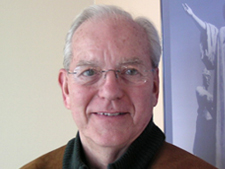Lincoln Hall Project

Geography professor emeritus Bruce Hannon (BE ’56, civil engineering; ME ’65, engineering mechanics; PhD ’70, engineering mechanics) discusses how a family vacation led to a career in environmentalism.
We decided for the summer vacations that we would go for the—I think it was the five-day family camp at Allerton Park. Since I had grown up here, I knew the park pretty well. I had walked in it as a child with my father and gone along the river. So I knew it pretty well. And the family camp was situated in the 4-H part of Allerton Park, and we were all over there. And I can remember my wife coming by, saying, “Let’s go for a hike. They’re giving a kind of a tour of the grounds of Allerton.”
I said, “I already know all there is to know about that.”
I was busy, strangely enough, refinishing some old violins that we had in the family—for some reason, I don’t know why. But that’s an important part of the tale in a moment. She’s gone a couple of hours. She comes back; I’m still sitting in this little cabin they had while the children are off doing all the arts and crafts and recreation. She’s standing at the window of this place, which was just a screen, because this place was only used in the summer time. And I could almost feel the heat coming from this woman at that time. She said, “Do you know what they’re going to do. The Corp of Engineers is planning on building a dam downstream at Decatur, and that water would back up across this park.”
And I’m going, “What?” And I sat down on the bed—right on the violins I was refinishing. And I cracked them. I had to take them all apart and re-glue them. And—(groans). Anyway. I was stunned at the audacity of anybody—that any organization thought they could do this. And sure enough, she was exactly right.
She holds a big bonfire, gets a petition going before this little family camp time was over. And then she says, “It’s yours now.” I didn’t know what I was going to do; I just knew that I would somehow stop this thing. And eight years later—I had just become an associate professor at that time—eight years later we stopped the dam.
In the process, my workload increased enormously, because the stopping of this dam became the highest priority in the teaching and studies arena. And it also introduced me to this idea of environmentalism. This was 1967. So I knew then that I did not want to practice as an engineer—as a result of this experience, I did not want to practice as an engineer. I was learning that as I went. I wanted to be this environmental kind of academic person—whatever in the world that meant. I was very uncertain about the whole affair, of course. Yet it seemed to me that it might be one way to not have to move, and that was to become an academic here at the University.
So in the process, as regards to the University, I got quite involved with my employer, you might say. In two different ways. One is they owned the park, and they had already decided to give it up to this reservoir. And so they became someone on “the other side.” And so, they were an adversary. So my own employer was an adversary. And they had to also defend me from, say, the mayor of Decatur or senators from Macon County—the side of the dam—who would come back here and demand that I be dismissed. So at the same time I was engaged in some very heavy rhetoric with the University, they were defending me. Which they did very well. I have always been proud of them for that.

(Length: 4:00)